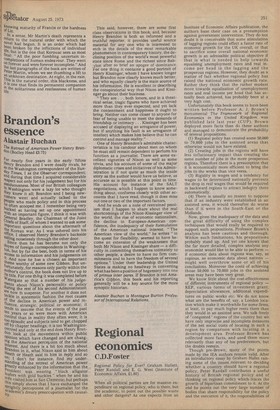Brandon's essence
Alastair Buchan
,The Retreat of American Power Henry Bran(Bodley Head E3.75) or nearly five years in the early 'fifties "enr)7 Brandon and I were deadly rivals, he QS the Washington correspondent of the Sun.Y Times, I as the Observer correspondent; and during that time I acquired considerable resPect not only for his judgement but for his a. ssiduousness. Most of our British colleagues In, Washington were a lazy lot who thought 'eY knew it all; Brandon and I being new corners went and actually talked to the fleoPle who made policy and in this process ,e often scooped me. I remember being very °ticked at having set up one appointment w,,ith an important figure, I think it was with ueneral Bradley, the Chairman of the Joint Chiefs of Staff, of whom I wanted to ask some int, Portant questions about the aftermath of tle Korean war. As I was ushered into his ,°;fice, I observed Henry Brandon's backside idling noiselessly through the other door. Since then he has become not only the ..s.°Yen of foreign correspondents in Washing
ton, but by far the best, both in terms of his
,aCeess to information and his judgements on Itt: And now he has a chosen an important ft"erne worthy of some new Gibbon. But un ortunately, for reasons only partly within the author's control, the book does not live up to I,tS title. For one thing it was completed before watergate so that a number of his judge
about , Nixon's personality or policy "ring the rest of his second Administration ar ,_e now suspense. For another it does not Lackle in systematic fashion the root causes ?f the decline in American power and in
:Itlence, strategic, political or economic; it ;ends to assume that the events of the past `en years or so were more with American control than in reality they often were; it is oft by and subjects tend to get chopped „
Dy chapter headings; it is too Washingtoncentred and only at the end does Henry Bran don look at the movements within public
913inion which have changed and are changl.ng the American perception of the national Interest. And there is a bit too much about 8Jandon in it, what Nixon said to him about tleath or Heath said to him in reply and so I don't for instance, find my understanding of the retreat of American power
greatly enhanced by the information that the rresident was wearing "black alligator 'oafers with gold buckles" when he and his
w,,ife visited him at San Clemente; but perhaps ns simply shows that I have exchanged the 'Prightly perceptions of a journalist for the iacademic's dreary preoccupation with causalty.
This said, however, there are some first class observations in this book, and, because Henry Brandon is both an informed and a truthful reporter, it provides useful source material for any one who is interested to etch in the details of the most remarkable phenomenon in contemporary history, the declining position of the world's most powerful state since Rome and the richest since Bab:ylon after so brief an apogee of dominance, for one thing it contains a good portrait of Henry Kissinger, whom I have known longer but Brandon now clearly knows much better, and who equally clearly is the main source of his information. He is excellent in describing the conspiratorial way that Nixon and Kissinger go about their business.
"They are . . . both loners, and in a theatrical sense, tragic figures who have achieved more than they ever expected, and yet lack the contentment and happiness it ought to bring. Neither can come closer to anyone for fear of being unable to meet the demands of friendship or intimacy ... Kissinger has been accused of displaying an arrogance of power, but if anything his fault is an arrogance of intellect which makes him believe that he can control and manage reality."
One of Henry Brandon's admirable characteristics is his candour about men on whom he must still remain dependent to perform his function as a journalist. There are some excellent vignettes of Nixon as well as some trivia, and his account of some of the major diplomatic crises and initiatives of his Administration is if not quite as much the inside story as the author would have us believe, as accurate as is possible at this point in time. His account for instance of the SALT negotiations, which I happen to know something about, conforms closely with other accounts that I have read, though it does miss out one or two of the important factors.
And he ends on a note of restrained pessiism that I happen to share about the real shortcomings of the Nixon-Kissinger view of the world, the rise of economic nationalism, the decline in European-American confidence, the inadequacy of their formulation of the American national interest. "The American view of the world," he writes "in the quest for flexibility, seemed to have become an extension of the weaknesses that both Mr Nixon and Kissinger share — a difficulty in committing themselves intimately to other people, a desire to have no firm com mitments and to have the freedom of several options." Under their leadership the United States is making no headway in converting
what has been a position of hegemony into one of prirnus inter pares. If Brandon is not Ame
rica's Gibbon, this book and his reporting generally will be a key source for the more synoptic historian.
Alastair Buchan is Montague Burton Professor of International Relations.


































 Previous page
Previous page